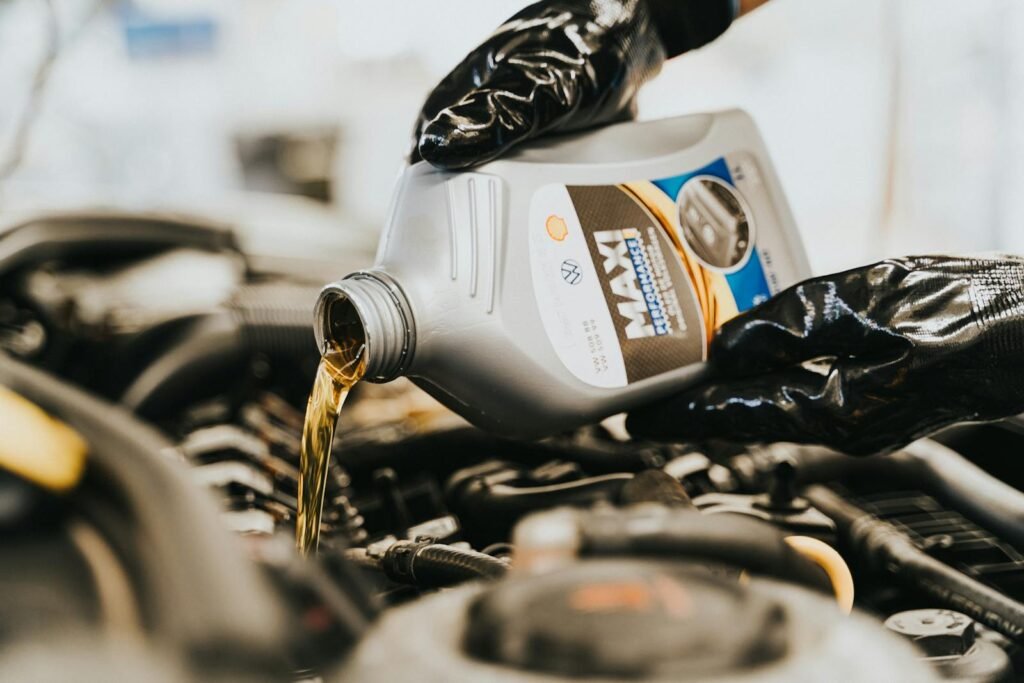You should not use car oil in a motorcycle. Car oil lacks the necessary additives for motorcycle engines.
Motorcycles and cars have different engine requirements. Motorcycle engines often share oil with the transmission and clutch, demanding specific additives for proper function. Car oils typically lack these additives, potentially leading to clutch slippage and engine wear. Using motorcycle-specific oil ensures optimal performance and longevity.
Always check your motorcycle’s manual for the recommended oil type. Using the correct oil helps maintain engine health, improves performance, and extends the life of your motorcycle. While it might be tempting to use car oil due to convenience or cost, it is crucial to use the right oil for your motorcycle’s unique needs.
Differences Between Car And Motorcycle Oil

Understanding the differences between car and motorcycle oil is crucial. These differences impact your engine’s performance and longevity. Let’s dive into two key aspects: Viscosity Levels and Additive Packages.
Viscosity Levels
Viscosity refers to the oil’s thickness and its resistance to flow. Car and motorcycle oils have different viscosity requirements.
- Motorcycle engines often run at higher RPMs than car engines.
- They require oils with specific viscosity to handle the stress.
- Using car oil in a motorcycle can lead to improper lubrication.
Here’s a quick comparison table:
| Aspect | Car Oil | Motorcycle Oil |
|---|---|---|
| Typical Viscosity | 5W-30, 10W-40 | 10W-40, 20W-50 |
| High RPM Adaptability | Lower | Higher |
Additive Packages
The additive packages in car and motorcycle oils differ greatly. These additives serve various purposes like reducing wear and preventing corrosion.
- Motorcycle oils contain additives for wet clutch compatibility.
- Car oils usually have friction modifiers which can harm motorcycle clutches.
- Motorcycle oils include anti-wear additives suitable for shared engine and transmission systems.
Using car oil can result in clutch slippage or even engine damage. Always check the oil label for JASO MA or MA2 ratings for motorcycles.
Engine Design Variations

Understanding engine design variations is crucial when discussing car oil and motorcycle engines. Different engines have unique needs. This section explores key differences.
Cooling Systems
Motorcycles and cars have different cooling systems. Cars often use liquid cooling. Motorcycles may use air or liquid cooling. Air-cooled engines need specific oils. These oils handle higher temperatures. Liquid-cooled engines have different requirements.
| Type | Cooling Method | Oil Requirement |
|---|---|---|
| Car Engine | Mostly Liquid | Standard Car Oil |
| Motorcycle Engine | Air or Liquid | Specialized Motorcycle Oil |
Engine Load
Engine load is another key difference. Motorcycle engines often run at higher RPMs. Higher RPMs mean more stress. Car oils may not handle this stress well. Motorcycle oils are designed for high RPMs. They protect the engine better.
- Motorcycles run at higher RPMs
- Car oils may break down under stress
- Motorcycle oils offer better protection
Using the correct oil is important. It ensures engine longevity and performance. Always use the right oil for your engine type.
Impact On Motorcycle Performance
Using car oil in a motorcycle can affect its performance. Let’s explore how it impacts friction and wear, and fuel efficiency.
Friction And Wear
Motorcycle engines are different from car engines. They need specific oils to reduce friction and wear. Car oils may not have the right additives. This can lead to increased friction.
Increased friction can cause more wear on engine parts. It can also lead to overheating. Motorcycle oils have additives that car oils lack. These additives help reduce wear and protect engine parts.
Using car oil can shorten the engine’s lifespan. It can also cause frequent breakdowns. Always use the right oil for your motorcycle.
Fuel Efficiency
Using the wrong oil can affect fuel efficiency. Car oils can cause the engine to work harder. This means the motorcycle uses more fuel. Using the right oil can improve fuel efficiency.
Motorcycle oils are designed for better fuel economy. They help the engine run smoothly. This reduces fuel consumption. Using car oil can lead to poor fuel efficiency.
A well-lubricated engine runs more efficiently. It also produces less heat. This helps save fuel in the long run.
| Aspect | Car Oil | Motorcycle Oil |
|---|---|---|
| Friction and Wear | Higher friction, more wear | Lower friction, less wear |
| Fuel Efficiency | Poor | Better |
Always choose the right oil for your motorcycle. This ensures better performance and fuel efficiency.
Potential Risks And Damages
Using car oil in a motorcycle can cause significant issues. Car oils are designed for car engines, not motorcycles. This can lead to several potential risks and damages. Understanding these risks can save you from costly repairs.
Clutch Slippage
Motorcycles have a wet clutch system. Car oils contain friction modifiers. These modifiers can cause clutch slippage. Clutch slippage means the clutch can’t fully engage. This leads to power loss and poor performance.
Gearbox Issues
Motorcycle engines and gearboxes share the same oil. Car oils are not formulated for this. Using car oil can cause gearbox issues. Car oils lack the necessary additives. This can result in increased wear and tear on gears.
| Component | Risk |
|---|---|
| Clutch | Slippage |
| Gearbox | Increased wear |
Always use motorcycle-specific oil. It ensures the best performance and longevity of your bike.
Manufacturer Recommendations
Understanding manufacturer recommendations is crucial for motorcycle maintenance. These guidelines help ensure your bike runs smoothly and efficiently. Following these recommendations can extend your motorcycle’s lifespan and improve its performance.
Owner’s Manual
The owner’s manual is your primary guide for motorcycle maintenance. It contains valuable information about the type of oil your bike needs. Using the recommended oil type ensures the engine operates at its best.
Most owner’s manuals specify whether to use synthetic or conventional oil. They also suggest the oil’s viscosity rating, like 10W-40 or 20W-50. This information is tailored to your motorcycle’s engine and its operating conditions.
| Oil Type | Viscosity Rating |
|---|---|
| Synthetic | 10W-40 |
| Conventional | 20W-50 |
Refer to the owner’s manual before making any oil changes. This step ensures you are using the correct type of oil for your motorcycle.
Service Advisories
Manufacturers often release service advisories that provide updates and recommendations. These advisories may include changes in oil type or maintenance practices. Staying updated with these advisories helps keep your motorcycle in top condition.
Service advisories are usually available on the manufacturer’s website. They can also be found through authorized service centers. These updates can sometimes override the information in your owner’s manual.
Below is a simple checklist to follow for service advisories:
- Check the manufacturer’s website regularly.
- Consult with authorized service centers.
- Keep a record of all service advisories received.
By following these steps, you can ensure that your motorcycle receives the latest and most accurate maintenance information.
Cost Considerations
Understanding the cost considerations is crucial when thinking about using car oil in a motorcycle. This section will delve into the price comparison and long-term expenses associated with this decision.
Price Comparison
The initial cost of car oil is generally lower than motorcycle oil. Here’s a breakdown:
| Oil Type | Price per Quart |
|---|---|
| Car Oil | $5 – $10 |
| Motorcycle Oil | $10 – $15 |
As you can see, the price per quart for car oil is cheaper. This can be tempting if you’re on a budget.
Long-term Expenses
Using car oil in your motorcycle may lead to higher long-term expenses. Here’s why:
- Engine Wear: Car oil lacks additives for motorcycle engines. This can cause more wear.
- Frequent Changes: Car oil degrades faster in motorcycles. You’ll need to change it more often.
- Potential Repairs: Engine damage from improper oil can lead to costly repairs.
These factors can outweigh the initial cost savings. Investing in the right oil can save money in the long run.
Environmental Effects

Using car oil in a motorcycle can harm the environment. There are two main areas of concern: oil disposal and emissions. Understanding these effects is crucial for eco-friendly riding.
Oil Disposal
Improper disposal of car oil used in motorcycles can damage the environment. Car oil has different chemical properties. These properties may not break down easily in nature.
- Car oil can contaminate soil and water.
- Improper disposal can harm plants and animals.
- It can disrupt local ecosystems.
Always dispose of used oil at designated collection centers. This simple step can protect the environment.
Emissions
Motorcycles using car oil can produce more harmful emissions. Car oil is not optimized for motorcycle engines. This can lead to incomplete combustion.
| Oil Type | Emission Levels |
|---|---|
| Motorcycle Oil | Low |
| Car Oil | High |
Higher emissions contribute to air pollution. This can affect human health and the environment. Using the correct oil can reduce emissions and help the planet.
Alternative Solutions
Using car oil in a motorcycle can cause problems. Motorcycles have unique needs. Alternative solutions exist to ensure your motorcycle runs smoothly. Explore these options to keep your engine in top shape.
Motorcycle-specific Oils
Motorcycle-specific oils are designed for your bike. These oils cater to the unique demands of motorcycle engines. They handle the higher RPMs and temperatures. Motorcycle oils also protect the clutch. This prevents slippage and wear. Using the right oil extends your engine’s life.
Here are some benefits of motorcycle-specific oils:
- Enhanced engine protection
- Reduced wear and tear
- Improved clutch performance
- Better heat management
Choosing the right oil for your motorcycle is crucial. Always check your manual for recommendations.
Synthetic Options
Synthetic oils offer superior performance. They are engineered for high performance and durability. Synthetic oils provide better lubrication. They reduce friction and wear. These oils also handle extreme temperatures well.
Here is a comparison table of synthetic oils:
| Oil Type | Benefits | Drawbacks |
|---|---|---|
| Full Synthetic | Best protection, long-lasting | More expensive |
| Semi-Synthetic | Good performance, affordable | Less durable than full synthetic |
Using synthetic oils can enhance your motorcycle’s performance. They are a great alternative to car oils. Your motorcycle will thank you for it!
Frequently Asked Questions
Can I Use Car Engine Oil In A Motorcycle?
No, you should not use car engine oil in a motorcycle. Motorcycle engines need specific oil for proper lubrication and performance.
Can I Use 10w30 Car Oil In My Motorcycle?
You can use 10W30 car oil in your motorcycle if it meets the manufacturer’s specifications. Check the manual first.
Can I Use 10w40 Car Oil In My Honda Motorcycle?
You can use 10W40 car oil in your Honda motorcycle if it meets JASO MA or MA2 standards. Always check your owner’s manual for specific recommendations.
What Happens If You Use The Wrong Oil In A Motorcycle?
Using the wrong oil in a motorcycle can cause engine damage, reduced performance, and increased wear. Always use manufacturer-recommended oil.
Conclusion
Using car oil in a motorcycle can cause engine damage. Always use the oil specified by the manufacturer. Proper oil ensures optimal performance and longevity. Check your motorcycle’s manual for the right oil type. This simple step can save you from costly repairs and ensure a smooth ride.
